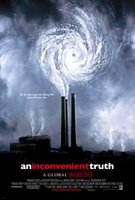 I just had the good fortune of seeing An Inconvenient Truth, the documentary about global warming as presented by Al Gore. It's a must-see.
I just had the good fortune of seeing An Inconvenient Truth, the documentary about global warming as presented by Al Gore. It's a must-see.Though I'm not a student of global climate change, I consider myself to be someone who's reasonably well-informed. After having seen An Inconvenient Truth, however, I've discovered that I'm not. The film is chock-full of information about the phenomenon, one that's disputed, apparently, only by those outside of the scientific community. There, there's a clear consensus: it's happening, and something needs to be done--yesterday. One of the most provocative moments of the film for me occurred near the middle, where Gore contrasted scientific and popular views on global climate change. Despite the fact that more than 900 scientific studies confirm the existence of global warming without a dissenting voice, more than half of all news stories appearing in the popular media dispute its existence.
Gore attributes this disparity of views, and the government's refusal to take more positive steps toward a solution, to those who cast doubt on the phenomenon--those who work, for example, in P.R. firms in the employ of energy profiteers. And here I need to make what's admittedly a strange leap to talk about cultural studies. I find, as I finish my own book, that a great deal of what I do as a practitioner of cultural studies is precisely that--to cast doubt. Part of what I try to do, too, is to tell a different, better story about whatever it is I'm trying to talk about, whether it's books, intellectual property, cultural studies, or something else entirely. But I find in my own work, and in at least some work in cultural studies, that we don't move sufficiently beyond casting doubt. I can't help but think that at least sometimes, my own work supports a culture of unhealthy skepticism.
An Inconvenient Truth shines, though, in that it puts forth a vision of a more environmentally sustainable word and explains how change could be made at the level of the everyday and beyond. The film offers a normative, forward-looking vision of the world, the kind of thing that I think cultural studies would do well to offer, too.
No comments:
Post a Comment